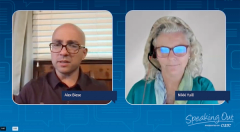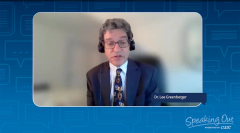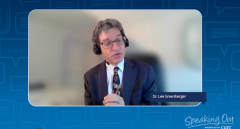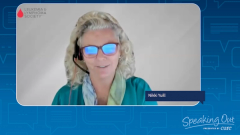
'Help out there’ for patients with leukemia and lymphoma through education, support programs
As part of its Speaking Out video series, CURE spoke with Nikki Yuill, oncology social worker and director of the Leukemia & Lymphoma Society’s Information Resource Center, about some of the challenges faced by patients.
Episodes in this series

Transcription:
Alex Biese: Hi, my name is Alex Biese. I'm the assistant managing editor of CURE magazine. In this edition of the "Speaking Out" video series, on behalf of the Leukemia & Lymphoma Society, we're speaking with oncology social worker and director of LLS' Information Resource Center Nikki Yuill about issues faced by patients, including psychosocial and financial concerns, and what resources are available to them. Nikki, thank you so much for taking some time to talk today.
Nikki Yuill: Great, thank you for having me.
Biese:It's our pleasure. So, what are some of the psychosocial concerns faced by patients with leukemia and lymphoma?
Yuill: So again, I think the cancer journey, in general, we're looking at really intense emotions like sadness, anger, stress. All of these are normal and healthy responses to difficult life events, such as a blood cancer diagnosis. However, what we want to be mindful about is sometimes if these emotions are persistent, persistent feelings of sadness, or distress and anxiety might be an indication that folks need additional support through a mental health counselor, or maybe group support.
So, one thing we know is that everyone can benefit from caring for their mental health and taking care of themselves, and this is also true for caregivers, and really checking in with how they're feeling and how they're coping. And this also goes back to why it's so important to have that trusting relationship with your healthcare team and your doctor so that there's constant communication, about how you're feeling and how you're coping. We really do believe that one's mental health is as equally important and vital as one's physical health. And, of course, I believe these are completely interwoven and inter interdependent. So if we're addressing their physical health, we absolutely need to address one's mental health.
Some of the things that we've seen with our patients and caregivers, is this really strong feeling of isolation, that can happen during the treatment and even the diagnosis period. This was exacerbated and made worse through COVID-19, the pandemic, the lived experience of so many cancer patients that were immunocompromised. And now, dare I say we're coming out of the pandemic, but we are officially, no longer in a pandemic, but our immunocompromised, and many of our blood cancer patients, haven't gone back to life as normal. And there's still this sense of being separated or isolated from family and disconnected from their community. So, from a mental health standpoint, this is really, really important that we talk about this and that we find resources to help folks.
The other area that I think is really important is, and we touched on this in a in a previous question, was the late- and long-term effects of treatment, and how this can also be an ongoing and sustained source of anxiety and stress and worry for patients. And so again, the importance of getting connected to support resources is extremely important. And that's true all the way through survivorship. For example, survivorship care plans (are) really important, not just for managing their medical care after treatment, but also checking in on their mental health and well-being throughout the entire survivorship process. This is really important.
Biese: Absolutely, I think the importance of mental and emotional health for really everybody cannot be over-stated. And in addition to that, what are some of the financial issues or hurdles patients potentially face?
Yuill: Again, the financial toxicity with blood cancer patients, unfortunately, it's increasing. And we know that part of this is simply the affordability of health care insurance premiums, out-of-pocket costs, monthly drug co-pays. Even with health insurance, there are many people that just simply cannot afford their medical care. And this leads to kind of a cascade of problems where maybe they're not able to work full time because of their diagnosis, so not only do they have medical bills, but their income has dropped. And then this leads to difficulties paying their rent or utilities, so we have housing insecurity, food insecurity, again also related to seeing an increase throughout the pandemic, people that really do not have access to quality foods and can't afford food, this is a real issue for cancer patients. And food insecurity often precedes financial toxicity. And as you can imagine, it impacts adherence, it impacts their survival, and it impacts a successful outcome.
So these type of financial concerns and worries, transportation, childcare, all of these things add up to the burden that's put on cancer patients. And at LLS, one of the things that we really want to make sure that patients are connected to is not only our financial resources that are available through the Leukemia & Lymphoma Society, but our information specialists who are highly trained oncology social workers and nurses can make sure that we're connecting them to resources available locally in their community, or maybe we can get them connected back to their oncology social worker and their treatment team, but really taking a look at the whole person and making sure that we're plugging in every resource available to help with the financial distress.
Biese: Absolutely. And on the topic of resources, I know you said there are resources available probably on a local, county or state level, but what are some of the resources available to patients to help them manage the medical, the practical, mental/emotional and financial aspects of life with leukemia or lymphoma?
Yuill: Well, this is where LLS shines. And remember, all of our services are absolutely free. So, one of the things that we really pride ourselves in is access to an information specialist and accurate disease and treatment information that is free. We have webcasts, we have podcasts, we have local education programs, we have local family support groups and patient support groups. We have our online chats, we have our Patti Robinson Kaufmann First Connection Program, which is a peer-to-peer match for both caregivers and patients. We have support through our financial programs through LLS that we want to make sure that we get folks plugged into.
So, there's a whole array, we have our one-on-one nutrition program, where folks could get a one-on-one consultation with a dietitian, we have our Clinical Trial Support Center, of course, which is also one-on-one support for folks that are seeking a clinical trial or clinical trial search. And then my team, which is the Information Resource Center, which is that one-on-one guided support for patients and families to look at all of their needs, not just financial, but really trying to plug in every resource that we can to ensure the most successful outcome. That's what LLS is here for. And we want patients to have hope. Even in these really difficult challenging situations, we want them to know that they're not alone. And that there is help out there.
Biese: And Nikki finally, if folks out there wants to connect with LLS or are looking for more information, where should they turn to?
Yuill: We would encourage health care professionals, patients and caregivers to please reach out to LLS. They can reach us at 1-800-955-4572 for one of our information specialists. We're available from 9 a.m. to 9 p.m. Eastern Time, Monday through Friday. They can also check out a patient referral and patient information at our website through LLS.org. We're here for you and we would love if folks would reach out to us.
Biese: Thank you very much. And Nikki, thank you so much for taking some time today to shed light on some of these very important topics. It is incredibly appreciated. So thank you again. I hope you have a great day.
Yuill: Thank you.
Transcription edited for clarity and conciseness.
For more news on cancer updates, research and education, don’t forget to








